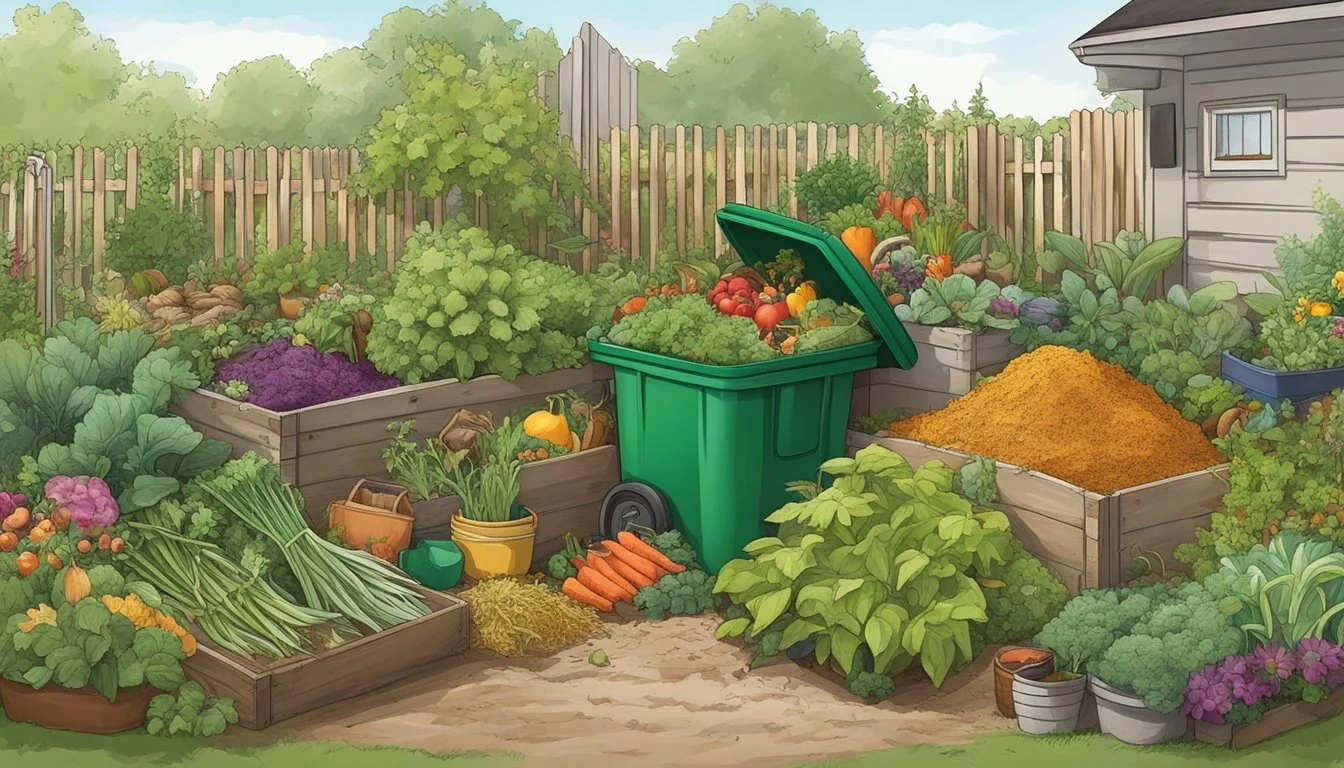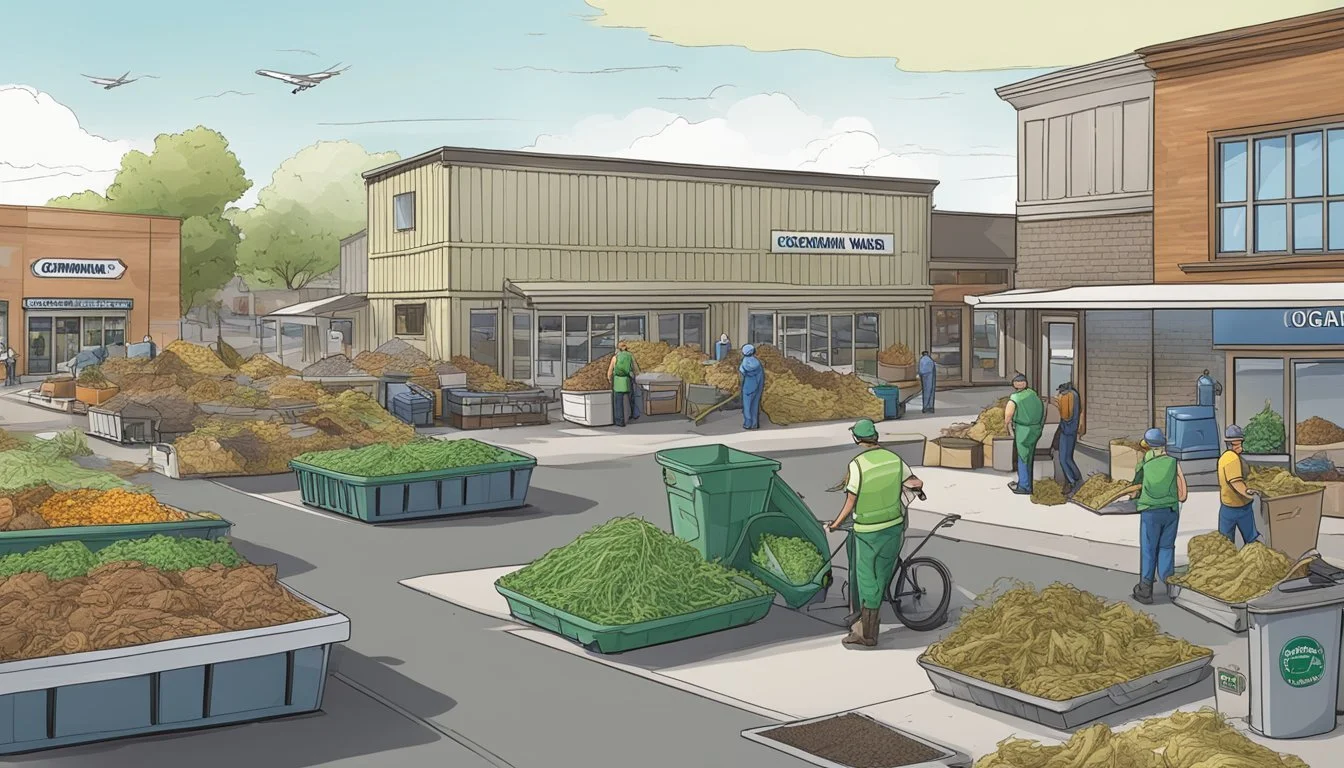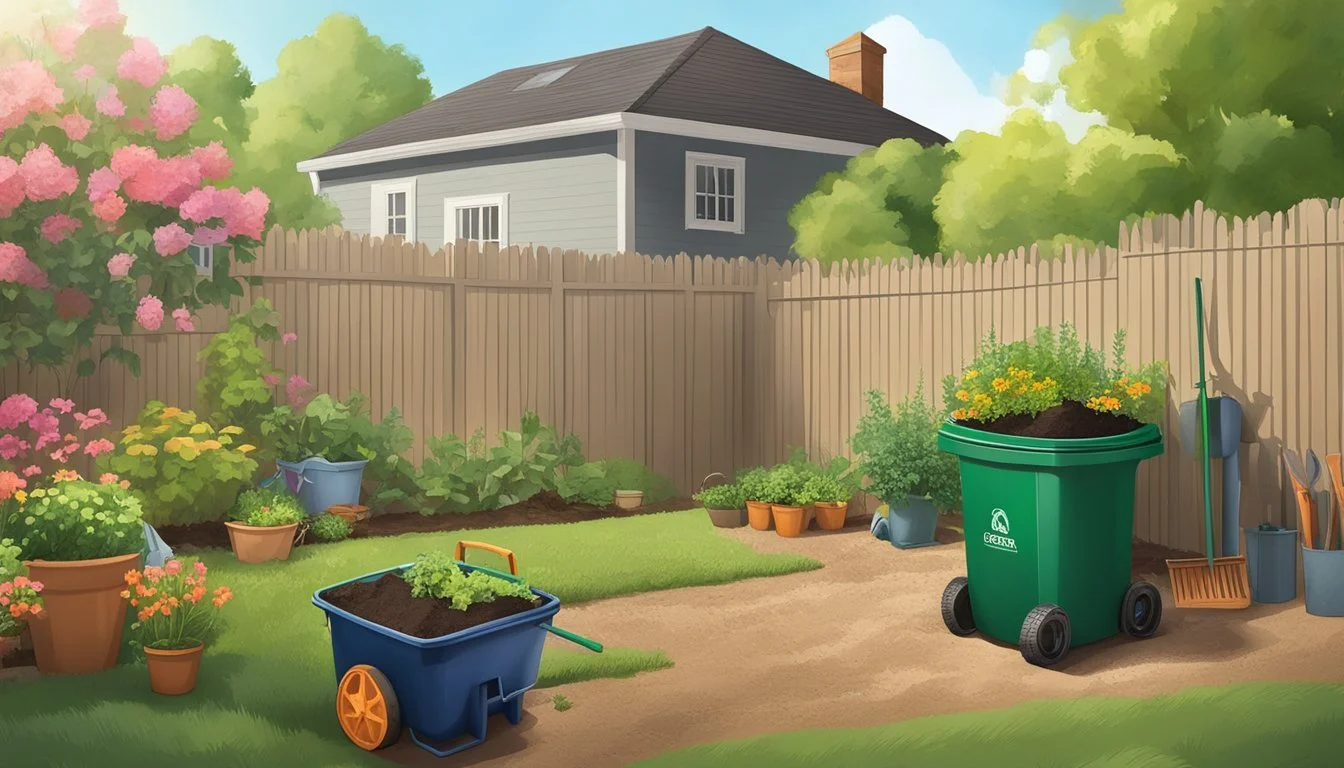Guide to Composting in Meridian, ID
Essential Tips for Beginners
Composting in Meridian, Idaho, represents a growing interest in sustainable living and responsible waste management. With an increase in environmental awareness, the residents of Meridian are exploring the benefits of converting organic waste into a valuable resource. Composting is an effective way to decrease material sent to the landfill, extending valuable landfill capacity, which is not only beneficial for the environment but can also enrich the soil for gardening and landscaping purposes.
In an effort to support these environmental goals, the city evaluates the implementation of a citywide composting program, assessing both the financial implications and the ecological advantages. Residents who are eager to start composting can tap into a variety of resources, such as the Idaho Department of Environmental Quality's guidelines on recycling, reuse, and composting. These guidelines help ensure that practices are consistent with local regulations, promoting safe and effective composting methods.
Additionally, local services like Timber Creek Recycling are addressing community desires by converting sections of their farms for composting use, indicating a strong move towards more widespread organic waste recycling solutions. As composting gains traction, individuals in Meridian can also explore resources, such as tips on composting at home, to begin their own composting journey and contribute to the city's environmental sustainability efforts.
Basics of Composting
In the city of Meridian, composting is a practical way to convert organic waste into a valuable soil amendment. This process supports sustainability and enriches gardens and landscapes.
What is Composting?
Composting is the controlled breakdown of organic materials, such as leaves, grass clippings, and kitchen scraps, into carbon-rich, nutrient-rich soil known as compost. Through this natural procedure, microorganisms break down plant and food waste in the presence of oxygen, transforming it into a dark, earthy, and soil-like substance.
Benefits of Composting
Composting offers multiple advantages. It not only creates a nutrient-rich and beneficial product out of what would otherwise be waste but also provides an environmentally-friendly alternative to traditional disposal methods. By composting, residents can enhance soil quality, reduce landfill usage, and lower their carbon footprint, contributing to a healthier ecosystem.
Getting Started with Composting in Meridian
In Meridian, ID, residents have the opportunity to reduce waste and enrich their gardens through composting. This section provides the foundational steps to begin composting effectively in your own backyard.
Choosing the Right Composting System
For those living in Meridian, selecting the appropriate composting system is a crucial first step. Options range from simple heaps in a corner of the yard to enclosed bins that can accelerate the composting process. Residents should consider the size of their garden, the quantity of compostable material they expect to generate, and the level of maintenance they are willing to perform.
Open piles: An uncontained pile, suitable for large amounts of yard waste, but may attract pests.
Bins: A contained system that can limit odors and discourage pests. Can be store-bought or homemade.
Selecting Your Composting Site
A good composting site is both convenient and functional. She should choose a level spot that has good drainage and partial sunlight to help maintain the necessary moisture and temperature. It should also be easy to access year-round.
Proximity: Close enough to the house for regular additions, but far from living areas to avoid any odors.
Surface: Ideally, it should be placed on soil or grass to facilitate organisms that aid decomposition.
Balancing Compost Ingredients
For an effective composting process, the balance of greens (nitrogen-rich food waste) and browns (carbon-rich yard waste) is essential.
Greens include kitchen scraps like fruit and vegetable peelings, coffee grounds, and grass clippings.
Browns encompass dry leaves, branches, straw, and paper products.
The ideal ratio is approximately 3 parts browns to 1 part greens. Residents need to layer their materials and turn the pile periodically to aerate and help speed up the decomposition process.
Advanced Composting Techniques
In this section, one will find detailed guidance on refining composting practices to achieve optimal results. These techniques are crucial for a successful composting process, particularly for residents participating in green initiatives like Meridian's composting program.
Composting Do's and Don'ts
Do:
Balance your compost pile with a mix of green material, like grass clippings, and brown material, such as dry leaves or sticks, to maintain the right carbon to nitrogen ratio.
Chop or shred larger materials to speed up the decomposition process.
Don't:
Overlook the importance of moisture; your pile should be as wet as a wrung-out sponge.
Add meat, dairy, or oils, which can cause odors and attract pests.
Maintaining Your Compost Pile
Regular Turning:
Turning the pile every week or two introduces oxygen, which is vital for the composting process.
Moisture Control:
Maintain moisture levels by wetting the pile as needed, especially during dry conditions.
Temperature Monitoring:
The compost should feel warm. Use a thermometer to check that the pile is between 135-160°F, the ideal range for decomposition.
Troubleshooting Common Issues
Odor:
Bad smells often indicate an imbalance in the compost. Address this by adding more brown material to increase the carbon content.
Pests:
Keep the pile covered to deter animals. Do not include food scraps that are especially attractive to them.
Slow Decomposition:
If the pile is too dry, add water and green materials. Conversely, if too wet, add brown materials to absorb excess moisture and reintroduce air flow by turning the pile.
Composting and Community Involvement
In Meridian, composting extends beyond the backyard and into the fabric of the community with various public and local initiatives designed to promote sustainability and engage citizens.
Meridian's Public Composting Initiatives
The City of Meridian is exploring ways to expand its composting program, acknowledging the community's interest in sustainable waste management. Although the current program requires a subscription for curbside pickup of yard waste, residents have expressed a desire for broader services. Republic Services, in collaboration with the city, may consider upgrades that could include the collection of additional organic materials.
Local Composting Resources
Local businesses like Timber Creek Recycling offer composting services to Meridian residents. They enable the diversion of organic waste from landfills toward productive uses, such as land restoration projects. Moreover, local conservation sites promote composting as an educational tool and provide resources for those interested in starting their own composting processes at home.
How to Engage with Community Composting
Residents looking to get involved in community composting can participate in various ways: they may join local workshops hosted by environmental organizations or volunteer at community gardens where composting is part of the eco-cycle. Recycling initiatives often have components tailored to composting education, aiming to integrate these practices into daily life and bolster community-wide conservation efforts.
Composting Regulations and Guidelines
Composting in Meridian, Idaho, involves city-specific ordinances and environmental quality controls. It is crucial for the community and individuals to understand and adhere to these regulations to ensure a successful and compliant composting program.
City Composting Policies
Meridian's city council has set forth the guidelines for the composting program which residents can opt into. This subscription-based curbside pickup service is specifically for organic yard waste like grass clippings and leaves. Unlike Boise, the acceptance of materials in Meridian's compost bins is more limited. The Idaho Department of Environmental Quality (DEQ) provides regulatory guidance to ensure composting efforts align with state environmental goals.
Tiered Facility Regulations: Composting facilities in Idaho are subject to Tier II and Tier III Processing Facility Guidelines, requiring compliance with the state's solid waste management rules.
County-Level Oversight: Contacting Ada County provides further details on local rules, as county ordinances may add additional specificity to state guidelines.
Health and Safety Considerations
When it comes to the composting process, health and safety are of paramount importance. Not only does the DEQ ensure that facilities are following proper protocols, but it also provides resources to assist facility owners and operators in mitigating any potential health risks.
Composting Process Standards: Facilities must maintain materials at specific conditions to prevent attracting pests and producing odors, which are common concerns for residents.
Waste Management Integration: Composting is positioned as part of a broader waste management strategy at locations like the Ada County Landfill, where diversion of organics helps extend landfill lifespans and reduces methane emissions from waste.
Composting for Businesses
In Meridian, ID, businesses are recognizing the importance of composting as a key aspect of waste management and sustainability practices.
Commercial Composting Solutions
Commercial composting in Meridian provides an array of solutions for businesses looking to reduce their environmental footprint. Companies like Timber Creek Recycling LLC are at the forefront, aiming to expand their recycling services to include commercial composting. Partnerships, such as the one proposed with Republic Services, are key for businesses to access curbside composting services and integrate responsible waste management into their daily operations.
Business Benefits of Composting
Composting offers a multitude of benefits for businesses. Firstly, composting significantly reduces the amount of waste sent to landfills, therefore lowering the associated disposal costs. By redirecting organic waste into recycling efforts, businesses can also contribute positively towards Meridian's community environmental goals. Additionally, participating in compost programs can enhance a business's public image, showcasing their commitment to sustainability.
Environmental Impact and Sustainability
In Meridian, ID, the commitment to composting is a reflection of a broader dedication to environmental stewardship. This eco-conscious approach is instrumental in waste minimization and the establishment of sustainable habits.
Composting and Waste Reduction
Composting in Meridian plays a pivotal role in waste reduction efforts. By converting organic waste into compost, the city can significantly decrease the volume of material sent to landfills. This has a direct impact on reducing methane emissions—a potent greenhouse gas. An effective composting program can also reduce the need for waste transportation, which in turn, lowers CO2 emissions from waste management vehicles.
Creating a Sustainable Practice
The adoption of composting in Meridian is an environmentally-friendly alternative to traditional waste disposal methods. It is a renewable energy resource, as the compost produced can be used to enrich the soil, thereby sustaining the agricultural landscape without the need for chemical fertilizers. By encouraging residents to participate in composting, Meridian moves closer to the goal of becoming a carbon neutral community. It's clear that integrating composting into the city's waste management system supports a healthier planet.
Human Composting Service in Meridian
Meridian, Idaho has embraced an environmentally friendly alternative to traditional burial and cremation known as human composting. This method aligns with the conservationist values by offering a sustainable way to return to the earth.
What is Human Composting?
Human composting, also known as natural organic reduction, is an innovative funeral choice that transforms human remains into soil. This process typically spans about a 45-day process where the body is gently converted into nutrient-rich soil that can nourish the earth. It's a practice lauded by conservationists for its low carbon footprint compared to traditional burial and cremation methods.
Local Human Composting Services
In Meridian, services like Earth Funeral operate state-of-the-art facilities specifically designed for human composting. The facility aims to protect the planet by transforming remains through a soil transformation process. Clients receive updates at each stage and can participate in a ritual that emphasizes the body composting as a final act of stewarding the environment.
Conclusion
Residents of Meridian, ID have opportunities to contribute to sustainability through composting. They can opt for subscription-based curbside pickup, which caters specifically to the collection of grass clippings. Additionally, private companies within the region offer composting solutions for those seeking more extensive services.
The City of Meridian is addressing community calls for enhanced composting programs. There is discussion regarding commercial composting efforts, signaling a potential shift towards broader waste management solutions.
For environmentally conscious citizens, it’s beneficial to keep abreast of local policy changes and support initiatives aimed at expanding composting services. Community engagement remains a powerful driver for policy change, indicating the importance of public feedback in shaping the future of waste management. Individual action, combined with community-driven efforts, strengthens the impact of composting on reducing landfill waste.
Local regulations and opportunities for composting are outlined by the Idaho Department of Environmental Quality. It is recommended for residents to stay informed through official channels to ensure participation in accordance with city guidelines.
As Meridian moves forward, composting is set to take on a more significant role. These environmental strategies lay the groundwork for a greener future, reflecting a commitment to sustainability within the community.








